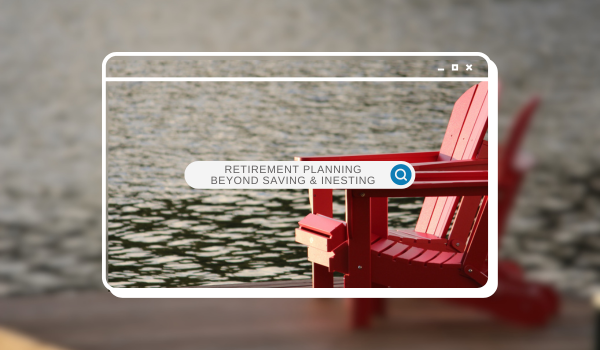5 Steps to a Successful Retirement (Beyond Saving & Investing)
January 26, 2024|Parker Elmore

Bottom Line Up Front
- Planning for retirement extends beyond saving and investing; it also involves preparing for the mental and emotional aspects.
- Filling your retirement with activities that give you a sense of purpose will make your golden years much more fulfilling and help you maintain your mental health.
- While you can retire and never look back, you may also have the option of opting for a gradual “phased retirement,” which many find easier to deal with psychologically.
You’ve all read about the need to save huge amounts and invest them well to be able to retire. While I’d rather have money than not, it’s only one element to a successful retirement. The psychology and mechanics of retirement are often overlooked and neglecting those can diminish the overall quality of your retirement, regardless of the capital you’ve accumulated.
1. Identity – who are you?
For many of us, we’ve worked 40 or more years in one or more careers. We are often defined by that career. Think about how you answer the question “what do you do?” – if you’re like most Americans, you’ll answer with something about your job or your career.
So, are you more than that job title? It’s important to remember you’re a complete individual and not let your career solely define who you are. The sooner you start focusing on your broader sense of self, the higher the odds of a more fulfilling retirement.
2. Future – what’s the plan?
Beyond your career, have you considered your plans and desires for retirement? It’s unlikely that every day will be dedicated to traveling, so what is it that gets you up each day? If you don’t have hobbies or interests outside your career, now is the time to begin developing those BEFORE retirement so that you’re not walking into a void without fulfilling activities.
3. Meaning – what feeds you?
During your career, it was easy – you had a purpose each day (go to work, support a family, help your team, etc.). Your job made you feel useful.
Without that structure, you’ll want to find things that can keep you inspired and provide purpose in retirement. Examples include:
✔️ Volunteer work
✔️ School or learning new skills
✔️ Travel or exploration
✔️ Start a new hobby or restart an old one
4. Brain health – how to stay engaged?
After spending a majority of your adult years working, you’ve likely never had to think about managing your cognitive health. While working keeps your brain stimulated, once you hit retirement, you’ll no longer be sought out for advice or counsel. Research has proven to show that in retirement, both mental and physical health decreases.1 It can also increase other mental health issues.
So how do you stay engaged and keep your brain sharp?
Examples may include part-time work/consulting, volunteering, creative hobbies, and other stimulating activities. These activities can actually have the opposite effect on your cognitive health by keeping your mind sharp. Like the old saying, “Use it or lose it.” Basically, you want to stay engaged to avoid boredom which ultimately leads to better overall health.
5. Work transition – phased or immediate?
A key thing to consider is whether you want to simply walk out the door without looking back when the day comes to retire or if you’d prefer a gradual “phased retirement” approach. Both options have their advantages, but many individuals find more fulfillment in a phased retirement. This allows them to tie up loose ends and complete projects, providing a sense of closure.
Additionally, a phased retirement can bring in extra income, boost your mental health, and possibly allow you to retain your employer-sponsored health care benefits.
Again, this is only designed to set the emotional & psychological foundation for a happy retirement. You’ll still need to save & invest, consider family history and longevity, plan for retiree healthcare costs and more, but retirement is more than just the money. We want to make sure you’re prepared in every way possible.
Looking for more? Explore these excellent articles on retirement and retirement planning:
Required Minimum Distributions (RMDs): When to Start Planning
Understanding Your Annuity Options at Retirement
5 Ways to Protect Your Retirement Account from Fraud and Identity Theft
Good luck & Happy Retirement.
1Reference: Kachan, D. (2015). Preventing Chronic Disease, 12. https://doi.org/10.5888/pcd12.150040
Categories: Retirement

About The Author As President and CEO of Odyssey Advisors, Parker Elmore is dedicated to quality service, expertise, and efficiency. With over 35 years of industry experience, Parker and the Odyssey team develop and implement solutions to the complex financial issues faced by...
More Insights From This author

October 2, 2024
Parker Elmore

August 28, 2023
Parker Elmore






